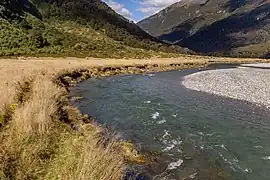Young River (New Zealand)
Young River is in the Otago region of the South Island of New Zealand. It lies within the Mount Aspiring National Park and feeds into the Makarora River 3 kilometres (2 mi) upriver from Makarora.
| Young River | |
|---|---|
 | |
| Location | |
| Country | New Zealand |
| Region | Otago |
| District | Queenstown-Lakes District |
| Physical characteristics | |
| Source | Mount Doris |
| • location | Southern Alps / Kā Tiritiri o te Moana |
| • coordinates | 44°7′19″S 169°2′42″E |
| Mouth | Makarora River |
• location | Makarora |
• coordinates | 44°12′S 169°14′E |
• elevation | 305 metres (1,000 ft) |
| Length | 21 kilometres (13 mi) |
| Basin features | |
| Progression | Young River North Branch → Young River → Makarora River → Clutha River / Mata-Au |
| River system | Clutha River / Mata-Au |
| Tributaries | |
| • right | Young River South Branch |
Course
The ultimate source of the Young River is at the head of Young River North Branch on the eastern slopes of Mount Doris on the main divide of the Southern Alps / Kā Tiritiri o te Moana. The river flow eastwards from it source. There is a landslide dam and 2.5 kilometres (2 mi) long lake 9 kilometres (6 mi) downstream, that formed in 2007. At the lake the river bends to the right and flows southwards for 6 kilometres (4 mi). The Gillespie Pass Circuit tramping track crosses the river using the Young Fork Bridge.[1]
At Young Fork approximately 14 kilometres (9 mi) downstream from the source of the north branch the Young River South Branch merges from the right. The river continues in flowing eastwards for 7 kilometres (4 mi) until it ultimately merges with the Makarora River 3.5 kilometres (2 mi) north of the village of Makarora
2007 Landslide
At 4:40 a.m. on August 29 2007, a debris avalanche occurred blocking the Young River North Branch. Approximately 11 million cubic metres (390×106 cu ft) of material fell in to the river valley from above forming a 70-metre (230 ft) high landslide dam.[2] A new lake began forming behind the dam. The lake eventually overtopped the dam on 5 October 2007. When fill, the lake is 2,500 metres (8,200 ft) long and 500 metres (1,600 ft) wide and has a volume of 23 million cubic metres (812×106 cu ft).[3]
See also
References
- "Gillespie Pass Circuit".
- Chris Massey, Mauri McSaveney, Neville Palmer, Vern Manville & Graham Hancox. "The Young River landslide" (PDF). GeoNet. GNS Science. Retrieved 11 February 2021.
{{cite web}}: CS1 maint: multiple names: authors list (link) - "Landslip lake holds, lures lookers". Stuff. 27 September 2007. Retrieved 11 February 2021.